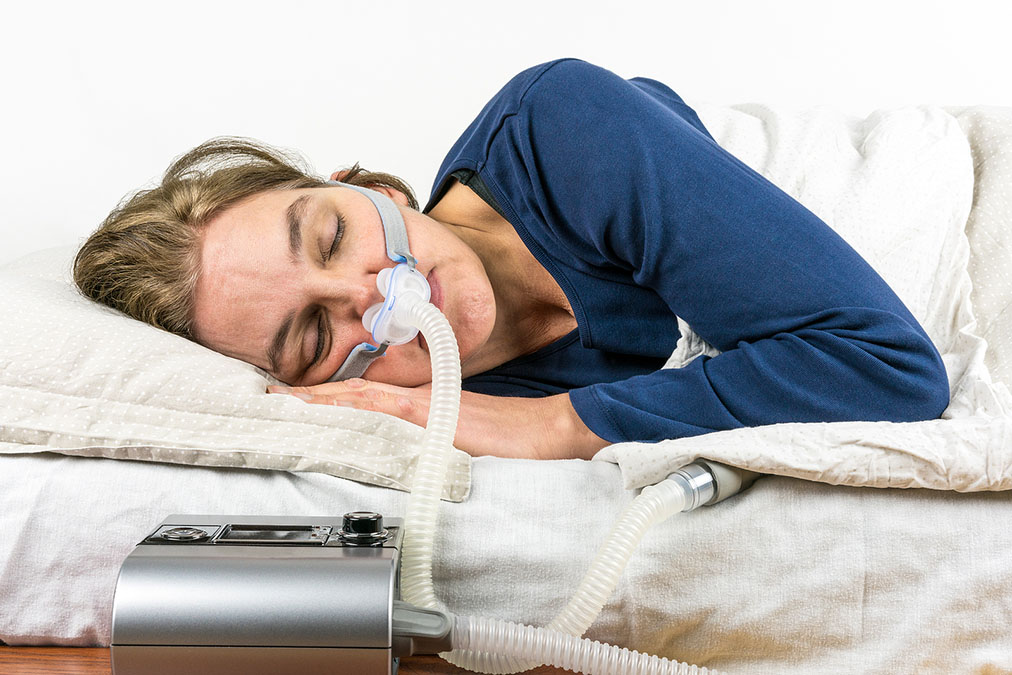 A common belief is that being overweight causes sleep apnea, and while that is indeed a factor, there’s more to the story.
A common belief is that being overweight causes sleep apnea, and while that is indeed a factor, there’s more to the story.
A recent study published in the journal Frontiers identified another associated factor, one that may be easier to manage than body weight.
The triglyceride glucose-body mass index (TyG-BMI) is a relatively new measure that combines body mass index (BMI) with triglyceride (blood fat) and glucose levels. This index is an accurate indicator of insulin resistance—a condition in which the body’s cells don’t respond effectively to insulin, resulting in higher blood sugar levels.
Insulin resistance is the main cause of type 2 diabetes and is closely associated with obesity, making the TyG-BMI index a valuable tool for assessing people’s overall health.
In this study, researchers investigated whether there is a significant association between the TyG-BMI index and the risk of developing sleep apnea. This is important because diabetes is typically considered a consequence rather than a risk factor for sleep apnea.
The researchers utilized data from the National Health and Nutrition Examination Survey (NHANES) from 2015 to 2018. This is a nationally representative survey of the U.S. population that collects detailed data on various health and nutritional factors.
For this analysis, 4,588 participants were included, all of whom submitted data on their BMI, triglyceride levels, glucose levels, and sleep apnea status.
After crunching the numbers, the results of the study were clear.
-
1. There was a significant association between higher TyG-BMI levels and an increased risk of sleep apnea, with participants high on the index being 54% more likely to develop this sleep breathing disorder.
2. TyG-BMI was a risk factor for sleep apnea only in people under the age of 60.
3. Factors such as gender, smoking status, and alcohol did not influence the strength of the association between TyG-BMI and sleep apnea.
4. There was a potentially strong risk of sleep apnea for people with diabetes, high blood pressure, and cardiovascular disease, but there were too few participants with these conditions to draw any definitive conclusions.

 Overcoming IBD
Overcoming IBD Multiple Sclerosis
Multiple Sclerosis Banishing Bronchitis
Banishing Bronchitis Gum Disease Gone
Gum Disease Gone Overcoming Onychomycosis
Overcoming Onychomycosis Neuropathy No More
Neuropathy No More The Prostate Protocol
The Prostate Protocol Brain Booster
Brain Booster
 Ironbound
Ironbound
 Solution for Shingles
Solution for Shingles
 The Bone Density Solution
The Bone Density Solution
 The Ultimate Healing Protocol
The Ultimate Healing Protocol
 The Parkinson's Protocol
The Parkinson's Protocol
 The Chronic Kidney Disease Solution
The Chronic Kidney Disease Solution
 Overthrowing Anxiety
Overthrowing Anxiety The Fatty Liver Solution
The Fatty Liver Solution The Hypothyroidism Solution
The Hypothyroidism Solution
 The End of Gout
The End of Gout The Blood Pressure Program
The Blood Pressure Program
 The Oxigized Cholesterol Strategy
The Oxigized Cholesterol Strategy
 Stop Snoring And Sleep Apnea Program
Stop Snoring And Sleep Apnea Program
 The Arthritis Strategy
The Arthritis Strategy The Vertigo & Dizziness Program
The Vertigo & Dizziness Program The 3-Step Diabetes Strategy
The 3-Step Diabetes Strategy Hemorrhoids Healing Protocol
Hemorrhoids Healing Protocol The Erectile Dysfunction Master
The Erectile Dysfunction Master Weight Loss Breeze
Weight Loss Breeze The IBS Program
The IBS Program The Insomnia Program
The Insomnia Program The Migraine and Headache Program
The Migraine and Headache Program The Neck Pain Solution
The Neck Pain Solution The Menopause Solution
The Menopause Solution The Ejaculation Master
The Ejaculation Master The TMJ Solution
The TMJ Solution The Acid Reflux Solution
The Acid Reflux Solution The Fibromyalgia Solution
The Fibromyalgia Solution The Psoriasis Strategy
The Psoriasis Strategy